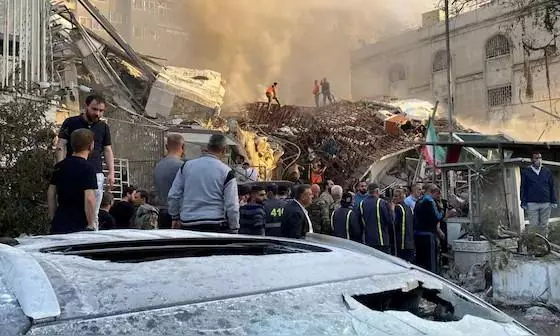
Israeli airstrikes in central Syria kill 14, target military sites near Masyaf
text_fieldsIsraeli airstrikes near the city of Masyaf in Hama province, central Syria, on Sunday night, killed at least 14 people and injured 43, targeting military sites.
The strikes sparked a fire and caused material damage in the area. Syria’s air defence systems reportedly intercepted and shot down some of the missiles, though the extent of the damage and the exact number of casualties remains unclear.
The assault marks yet another escalation in Israel’s long-running air campaign in Syria, which has primarily targeted sites linked to Iran.
The targeted sites are said to have included a significant military research facility near Masyaf that has been hit in previous Israeli strikes. The facility is thought to be involved in chemical weapons production and is reportedly supported by Iranian military experts stationed in the region.
Iran has accused Israel of carrying out a “criminal” attack in central Syria, where 18 people were reported killed. Iran’s foreign ministry condemned the strike and urged Israel’s supporters to stop backing it. Since Hamas’s 7 October attacks, Israel has escalated strikes on Iranian-backed militia targets and Syrian air defences.
Tensions between Israel and Iran have been rising for months, particularly following the assassination of Hamas leader Ismail Haniyeh in Tehran in July. Iran had pledged retaliation for the assassination, and Sunday's attack comes amid a backdrop of increased military exchanges between Israel and Iranian-linked groups in the region.
Iran maintains a significant military presence in Syria and has been one of the primary backers of Syrian President Bashar al-Assad throughout the country’s 13-year civil war. In April, Iran launched a large-scale missile and drone attack against Israel, reportedly in response to the Israeli bombing of an Iranian diplomatic facility in Damascus.
While Israeli and US air defences successfully intercepted most of the projectiles, the attack marked a sharp escalation in hostilities between the two regional rivals.
In parallel with these tensions, Hezbollah, the Iran-backed Lebanese militia, has also increased its military activities against Israel. Cross-border hostilities between Hezbollah and Israeli forces have been ongoing, with the Lebanese group targeting military sites in northern Israel and Syria’s occupied Golan Heights.
Hezbollah has framed its attacks as a response to Israeli actions in Gaza, where the ongoing Israeli offensive has claimed over 40,900 Palestinian lives.
Hezbollah’s operations escalated following the Israeli killing of one of its top commanders in an air raid in Beirut in late August, which also resulted in the deaths of several civilians. In retaliation, Hezbollah claimed to have successfully targeted an Israeli military intelligence site near Tel Aviv, though Israel insists that it had thwarted the attack with a pre-emptive strike.
Both Hezbollah and Israel have continued military operations in the region, with Israel vowing to push Hezbollah away from its northern borders. Israeli officials have also indicated that they are prepared to engage in all-out war if necessary to achieve this objective.
Meanwhile, Hezbollah has pledged to sustain its attacks until Israel halts its military actions in Gaza. The cycle of hostilities shows no sign of abating, with the possibility of a broader regional conflict looming.






















